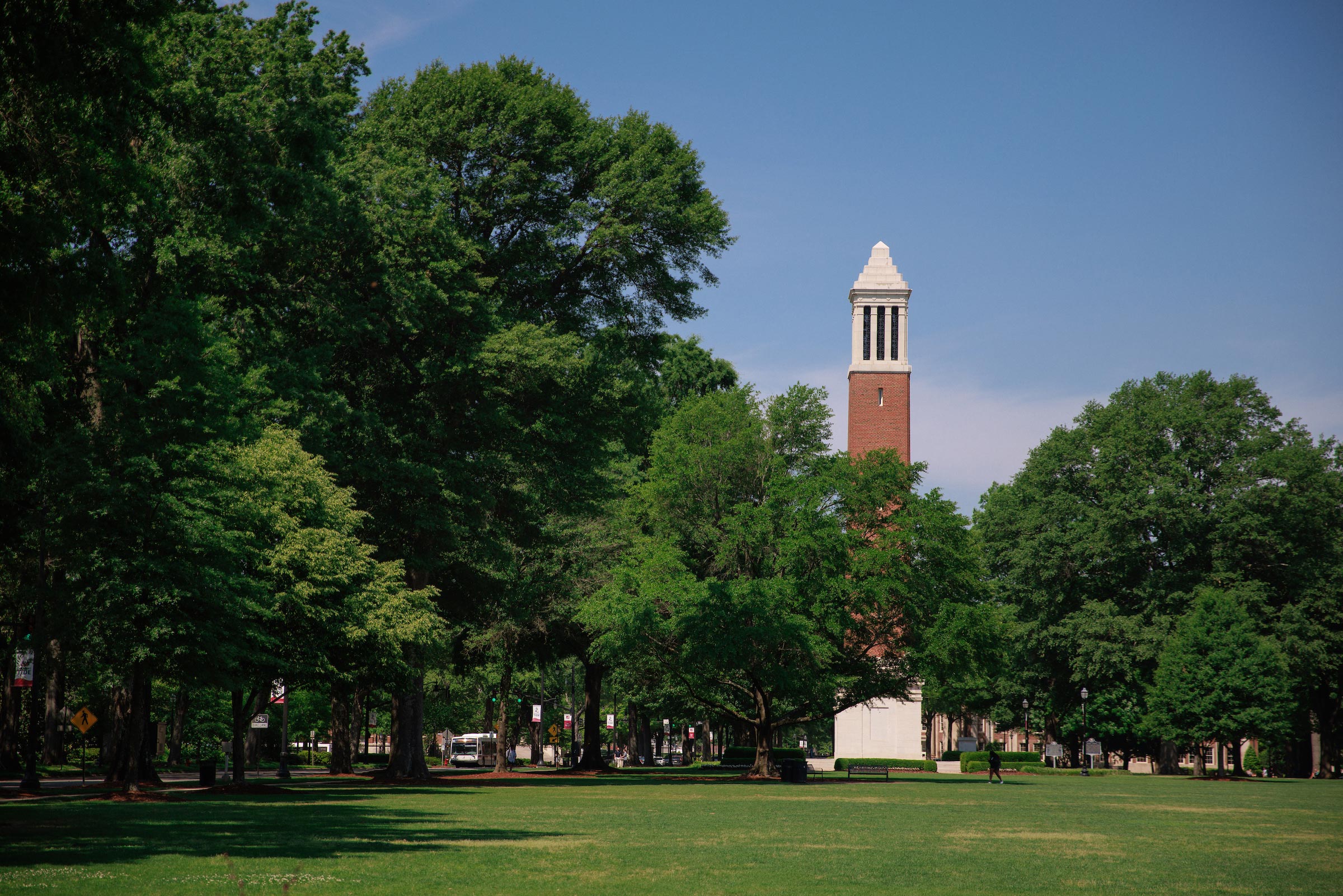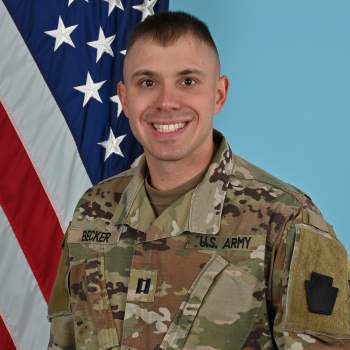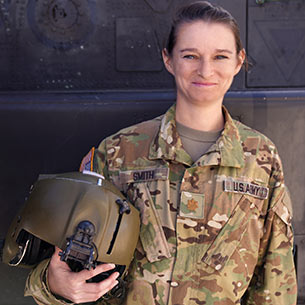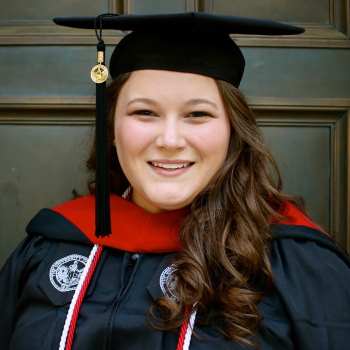Program Overview
Since 1965, The University of Alabama School of Social Work has been preparing Master of Social Work students to make a difference in the lives of others. Thanks to this innovative, primarily online program, you can earn this premier MSW while maintaining your other commitments.
Primarily Online Program Format
42-60 Credit Hours
$480 Tuition Per Hour
All Work is Social Work
Join our community of alumni serving clients across our state, nation and world when you earn this degree. Accredited by the Council on Social Work Education, our primarily online MSW will equip you for a rewarding career in social work.
The MSW program includes online coursework, virtual skills labs and a practicum education placement. To participate in this degree program, students must have access to a computer with high-speed internet connection. UA offers two options for earning your MSW: the Advanced-Standing Program and the Traditional Program. Both options offer the Advanced Generalist Concentration.
| Application Deadline | Advanced Standing Program Deadline is Febraury 1 for summer admission Traditional Program Deadline is April 1 for fall admission |
| Application Priority Deadline | Advanced Standing Priority Deadline: November 1; Traditional Prioirty Deadline: December 1 |
| Accreditation | Council on Social Work Education (CSWE) |
| Orientation Required | Yes |
| Practicum and Skills Lab | Yes |
| Scholarships and Grants Available | Discover a range of scholarships and grants to support your educational journey |
Curriculum
You may choose from two options: the Advanced Standing Program (requires a BSW) and the Traditional Program. Also available are two dual degree program options.
Please note that courses are subject to change.
Advanced Standing Program
The Advanced-Standing Program is a 42-credit-hour program for only those who hold a CSWE-accredited BSW. It can be completed in three semesters when pursued full-time. One cohort of Advanced-Standing students begins every year in late May or early June for the summer term.Students will complete 500 hours of practicum education. Coursework is offered primarily online and all skills labs will be virtual and synchronous beginning Spring 2024. Courses with an asterisk (*) indicate a skills lab.
Summer Semester (12 hours)
- SW 571 Research
- SW 576 Diversity, Oppression and Anti-racism
- SW 502 Foundations of Social Welfare Policy
- SW 512 Advanced Generalist Practice I: Components of Social Work Practice*
Fall Semester (15 hours)
- SW 530 Advanced Generalist Practice II: Psychopathology & Assessment*
- SW 531 Advanced Generalist Practice III: Mental Health Across the Lifespan*
- SW 584 Social Work Leadership and Management
- SW Elective Cluster Area
- SW Elective Cluster Area
Spring Semester (15 hours)
- SW 580 Advanced Policy Analysis
- SW 582 Practicum
- SW 583 Seminar
- SW Elective Cluster Area
Traditional Program
The Traditional Program is for those who do not currently hold a CSWE-accredited BSW. It can be completed in two years when pursued full-time. One cohort of Traditional students begins every year in August for the fall term.Students will complete 1,000 hours of practicum education. Coursework is offered primarily online and all skills labs will be virtual and synchronous beginning Spring 2024.
Fall Semester (15 hours)
- SW 576 Diversity, Oppression and Anti-racism
- SW 503 Human Behavior & Social Environment
- SW 504 Social Work Practice with Groups
- SW 505 Social Work Practice with Individuals and Families
- SW 538 Seminar
- SW 592 Practicum
Spring Semester (15 hours)
- SW 502 Foundations of Social Welfare Policy
- SW 543 Social Work Practice with Communities & Organizations
- SW 571 Social Work Research
- SW 539 Seminar
- SW 593 Practicum
Fall Semester (15 hours)
- SW 584 Social Work Leadership and Management
- SW 530 Advanced Generalist Practice II: Psychopathology & Assessment
- SW 531 Advanced Generalist Practice III: Mental Health Across the Lifespan
- SW 574 Seminar
- SW 597 Practicum
- SW Elective Cluster Area
Spring Semester (15 hours)
- SW 580 Advanced Policy Analysis
- SW 575 Seminar
- SW 598 Practicum
- SW Elective Cluster Area
- SW Elective Cluster Area
Elective Clusters
All MSW students receive training in Advanced Generalist Practice and will complete one of two Elective Cluster Areas.
Policy and Advocacy Cluster Area
- SW 519 Community-Based Policy Advocacy
- SW 520 Legislative & Policy Advocacy
- SW 521 Juvenile & Criminal Justice Policy: Interpretations for Social Work Practice
Clinical Behavioral Health Cluster Area
- SW 516 Trauma-Informed Social Work Practice
- SW 527 Advanced Clinical Social Work Practice
- SW 544 Substance Use and Social Work Practice
Dual Degree Programs
MSW/JD Dual Degree Program
The goal of the dual-degree MSW/JD program is to offer comprehensive preparation to individuals interested in becoming leaders in their communities, their state, or the nation, as well as leaders in promoting and enhancing social justice and individual well-being, through interventions, advocacy, organizational management, and public policy. Students will acquire knowledge of legal and social work strategies that can improve the lives of individuals and groups, by understanding forensic social work, the justice system, domestic violence, child protection, human rights, and more.
Students must be admitted to each program before they will be considered to be students in the joint program.
Admission requirements for the proposed dual-enrollment program are those currently established for both the MSW program and the JD program.
MSW/MPH Dual Degree Program
Social Work and Public Health are perfect partners. This program offers students interested in a career in social work and public health an alternative to the existing course of study for two separate programs. Graduates of the MSW/MPH Dual Degree program will have the skills needed to pursue leadership roles in community healthcare settings, government agencies, and non-profit organizations.
The MSW/MPH Dual Degree Program allows students the opportunity to earn two graduate degrees, a Master of Social Work (MSW) and a Master of Public Health (MPH) in two academic years, including two summers. All MSW students, including advanced standing, may apply for entrance into this program. If both degrees are earned sequentially, the completion period is three and one-half years and may permit some overlapping of transferred MSW/MPH credits.
Students who choose this dual degree plan must first secure admission to the School of Social Work, and then separately apply to the Department of Health Care Organization and Policy, The University of Alabama-Birmingham School of Public Health, for admission to the MPH Program.
The MSW/MPH Dual Degree Program is coordinated between the School of Social Work at The University of Alabama in Tuscaloosa and the School of Public Health/Department of Health Care Organization and Policy, concentration in Maternal and Child Health Policy and Leadership at the University of Alabama at Birmingham.
Curriculum Updates
Effective May 2026, the MSW Program will be removing the current concentrations of:
- Social Work with Children, Adolescents and Their Families
- Social Work with Adults and Their Families
At that time, the curriculum will emphasize Advanced Generalist for the Summer 2026 Cohort and beyond. This approach to social work practice is defined as the practitioner’s ability to simultaneously address complex situations within and across multiple levels and systems. This strength-based orientation incorporates core social work knowledge, skills, values and ethics preparing students to adequately assess and intervene at all levels of practice. Social workers across the globe need to be prepared to work in diverse geographic areas and to effectively address complex problems across multiples systems of intervention including individual, family, group, community, and organizational. Advanced generalist practice is differentiated from generalist practice in that it includes the complexity of the problem and context of service provision, has enhanced technical abilities, and more refined direct and indirect skills. Through this new focus, our graduates will be able to competently engage in independent application of advanced social work knowledge, theories, skills, values, and ethics into assessment and intervention at all system levels.
The new MSW curriculum will also incorporate two central frameworks:
- Social Justice Framework: This framework reflects a commitment to ethical social work practice as described in the National Association of Social Workers Code of Ethics and includes the following three tenets: (1) promoting the general welfare of society from local to global levels, (2) challenging social injustice on behalf and with communities that have been marginalized, and (3) practicing cultural humility and responsiveness thereby recognizing clients as experts of their own culture. These tenets will be discussed within a historical, social, environmental, and economic context to provide students with the knowledge, skills, and values they need to act as social justice advocates in collaboration with the persons and communities they are educated to serve.
- Trauma-Informed Framework: This model integrates behavioral health trauma-informed frameworks, community resiliency approaches, and the social justice framework into the concentration year of the MSW curriculum. Students will understand how the combined impact of disproportionate exposure to adverse childhood and life experiences can shape biopsychosocial development across the lifespan. The UA SSW educates students with the knowledge, skills, and values necessary to implement a trauma-informed framework across micro, mezzo, and macro levels of social work practice.
Admission
Advanced-Standing Program
Students will be admitted to the program in the summer semester. Deadlines for submitting completed Graduate School applications are February 1 with a priority deadline of November 1.
In addition to satisfying all admission requirements of the School of Social Work, admission with advanced standing also requires a “B” average or better in social work courses, with no more than one “C” in professional social work courses and grades of “B” or better in field education courses. Students must hold a bachelor of social work degree from an institution accredited by the Council on Social Work Education.
Advanced Standing Conditional Admits
Students who completed a BSW more than five years before applying to the MSW program may be considered for Conditional Admit.
In addition to the standard admissions requirements, these students must also:
- Submit a current Resume
- Submit a Technology Statement (1-2 pages, Times New Roman, 12-point font, double spaced) that gives an overview of their experience with technology since graduating from a BSW Program. For example, students should share any experiences with online courses or trainings, familiarity with videoconferencing tools such as Zoom, use of Microsoft Office, and any other technology used.
- Complete the SWEAP (Social Work Education Assessment Project) BSW assessment with a score of 70 or higher or have an active BSW license.
If the student does not successfully meet the above requirements, they may be considered for the Traditional MSW Program.
Traditional Program
Students must satisfy all admission requirements. Admission applications should be completed by April 1 for fall enrollment with a priority deadline of December 1.


Student Spotlight
Inspiring stories of success from students and alumni.
Take a look at some of our UA Online stories.
Contact Us
Program Information
Katie Montgomery
Admissions Representative 800-467-0227
katelynn.bama@ua.edu
Admissions Information
UA Online
800-467-0227
online@ua.edu










